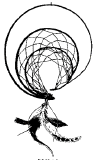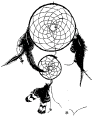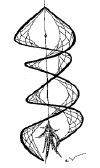The Soul of the Indian
Eastman, Charles Alexander (1911)
Our maidens were ambitious to attend a number of these
feasts before marriage, and it sometimes happened that a girl was compelled
to give one, on account of gossip about her conduct. Then it was in the
nature of a challenge to the scandal-mongers to prove their words! A similar
feast was sometimes made by the young men, for whom the rules were even more
strict, since no young man might attend this feast who had so much as spoken
of love to a maiden. It was considered a high honor among us to have won
some distinction in war and the chase, and above all to have been invited to
a seat in the council, before one had spoken to any girl save his own
sister.
It was our belief that the love of possessions is a
weakness to be overcome. Its appeal is to the material part, and if allowed
its way it will in time disturb the spiritual balance of the man. Therefore
the child must early learn the beauty of generosity. He is taught to give
what he prizes most, and that he may taste the happiness of giving, he is
made at an early age the family almoner. If a child is inclined to be
grasping, or to cling to any of his little possessions, legends are related
to him, telling of the contempt and disgrace falling upon the ungenerous and
mean man.
Public giving is a part of every important ceremony. It
properly belongs to the celebration of birth, marriage, and death, and is
observed whenever it is desired to do special honor to any person or event.
Upon such occasions it is common to give to the point of utter
impoverishment. The Indian in his simplicity literally gives away all that
he has, to relatives, to guests of another tribe or clan, but above all to
the poor and the aged, from whom he can hope for no return. Finally, the
gift to the "Great Mystery," the religious offering, may be of little value
in itself, but to the giver's own thought it should carry the meaning and
reward of true sacrifice.
Orphans and the aged are invariably cared for, not only by
their next of kin, but by the whole clan. It is the loving parent's pride to
have his daughters visit the unfortunate and the helpless, carry them food,
comb their hair, and mend their garments. The name "Wenonah," bestowed upon
the eldest daughter, distinctly implies all this, and a girl who failed in
her charitable duties was held to be unworthy of the name.
The man who is a skillful hunter, and whose wife is alive
to her opportunities makes many feasts, to which he is careful to invite the
older men of his clan, recognizing that they have outlived their period of
greatest activity, and now love nothing so well as to eat in good company,
and to live over the past. The old men, for their part, do their best to
requite his liberality with a little speech, in which they are apt to relate
the brave and generous deeds of their host's ancestors, finally
congratulating him upon being a worthy successor of an honorable line. Thus
his reputation is won as a hunter and a feast-maker, and almost as famous in
his way as the great warrior is he who has a recognized name and standing as
a "man of peace."
The true Indian sets no price upon either his property or
his labor. His generosity is only limited by his strength and ability. He
regards it as an honor to be selected for a difficult or dangerous service,
and would think it shame to ask for any reward, saying rather: "Let him whom
I serve express his thanks according to his own bringing up and his sense of
honor!"
Nevertheless, he recognizes rights in property. To steal
from one of his own tribe would be indeed disgrace if discovered, the name
of "Wamanon," or Thief, is fixed upon him forever as an unalterable. The
only exception to the rule is in the case of food, which is always free to
the hungry if there is none by to offer it. Other protection than the moral
law there could not be in an Indian community, where there were neither
locks nor doors, and everything was open and easy of access to all comers.
The property of the enemy is spoil of war, and it is
always allowable to confiscate it if possible. However, in the old days
there was not much plunder. Before the coming of the white man, there was in
fact little temptation or opportunity to despoil the enemy; but in modern
times the practice of "stealing horses" from hostile tribes has become
common, and is thought far from dishonorable.
Warfare we regarded as an institution the "Great Mystery"
-- an organized tournament or trial of courage and skill, with elaborate
rules and "counts" for the coveted honor of the eagle feather. It was held
to develop the quality of manliness and its motive was chivalric or
patriotic, but never the desire for territorial aggrandizement or the
overthrow of a brother nation. It was common, in early times, for a battle
or skirmish to last all day, with great display of daring and horsemanship
with scarcely more killed and wounded than may be carried from the field
during a university game of football.
The slayer of a man in battle was expected to mourn for
thirty days, blackening his face and loosening his hair according to the
custom. He of course considered it no sin to take the life of an enemy, and
this ceremonial mourning was a sign of reverence for the departed spirit.
The killing in war of non-combatants, such as women and children, is partly
explained by the fact that in savage life the woman without husband or
protector is in pitiable case, and it was supposed that the spirit of the
warrior would be better content if no widow and orphans were left to suffer
want, as well as to weep.
A scalp might originally be taken by the leader of the war
party only, and at that period no other mutilation was practiced. It was a
small lock not more than three inches square, which was carried only during
the thirty days' celebration of a victory, and afterward given religious
burial. Wanton cruelties and the more barbarous customs of war were greatly
intensified with the coming of the white man, who brought with him fiery
liquor and deadly weapons, aroused the Indian's worst passions, provoking in
him revenge and cupidity, and even offered bounties for the scalps of
innocent men, women, and children.
Murder within the tribe was a grave offense, to be atoned
for as the council might decree, and it often happened that the slayer was
called upon to pay the penalty with his own life. He made no attempt to
escape or to evade justice. That the crime was committed in the depths of
the forest or at dead of night, witnessed by no human eye, made no
difference to his mind. He was thoroughly convinced that all is known to the
"Great Mystery," and hence did not hesitate to give himself up, to stand his
trial by the old and wise men of the victim's clan. His own family and clan
might by no means attempt to excuse or to defend him, but his judges took
all the known circumstances into consideration, and if it appeared that he
slew in self-defense, or that the provocation was severe, he might be set
free after a thirty days' period of mourning in solitude. Otherwise the
murdered man's next of kin were authorized to take his life; and if they
refrained from doing so, as often happened, he remained an outcast from the
clan. A willful murder was a rare occurrence before the days of whiskey and
drunken rows, for we were not a violent or a quarrelsome people.
It is well remembered that Crow Dog, who killed the Sioux
chief, Spotted Tail, in 1881, calmly surrendered himself and was tried and
convicted by the courts in South Dakota. After his conviction, he was
permitted remarkable liberty in prison, such as perhaps no white man has
ever enjoyed when under sentence of death.
The cause of his act was a solemn commission received from
his people, nearly thirty years earlier, at the time that Spotted Tail
usurped the chieftainship by the aid of the military, whom he had aided.
Crow Dog was under a vow to slay the chief, in case he ever betrayed or
disgraced the name of the Brule Sioux. There is no doubt that he had
committed crimes both public and private, having been guilty of misuse of
office as well as of gross offenses against morality; therefore his death
was not a matter of personal vengeance but of just retribution
A few days before Crow Dog was to be executed, he asked
permission to visit his home and say farewell to his wife and twin boys,
then nine or ten years old. Strange to say, the request was granted, and the
condemned man sent home under escort of the deputy sheriff, who remained at
the Indian agency, merely telling his prisoner to report there on the
following day. When he did not appear the time set, the sheriff dispatched
Indian police after him.
They did not find him, and his wife simply said that Crow
Dog had desired to ride alone to the prison, and would reach there on the
day appointed. All doubt was removed next day by a telegram from Rapid City,
two hundred miles distant, saying Crow Dog has just reported here."
The incident drew public attention to the Indian murderer,
with the unexpected result that the case was reopened, and Crow Dog
acquitted. He still lives, a well-preserved man of about seventy-five years,
and is much respected among his own people.
It is said that, in the very early days, lying was a
capital offense among us. Believing that the deliberate liar is capable of
committing any crime behind the screen of cowardly untruth and
double-dealing, the destroyer of mutual confidence was summarily put to
death, that the evil might go no further.
Even the worst enemies of the Indian, those who accuse him
of treachery, blood-thirstiness, cruelty, and lust, have not denied his
courage but in their minds it is a courage is ignorant, brutal, and
fantastic. His own conception of bravery makes of it a high moral virtue,
for to him it consists not so much in aggressive self-assertion as in
absolute self-control. The truly brave man, we contend, yields neither to
fear nor anger, desire nor agony; he is at all times master of himself; his
courage rises to the heights of chivalry, patriotism, and real heroism.
"Let neither cold, hunger, nor pain, nor the fear of them,
neither the bristling teeth of danger nor the very jaws of death itself,
prevent you from doing a good deed," said an old chief to a scout who was
about to seek the buffalo in midwinter for the relief of a starving people.
This was his childlike conception of courage.
THE GREAT MYSTERY -
2
THE FAMILY ALTAR -
2
CEREMONIAL AND SYMBOLIC WORSHIP
-
2
BARBARISM AND THE MORAL CODE
-
2
UNWRITTEN SCRIPTURES
-
2
ON THE BORDERLAND OF SPIRITS
-
2
White Eagle Soaring: Dream Dancer of the 7th Fire







 Get
a course to promote your business online, explode your sales
Get
a course to promote your business online, explode your sales Get
software to promote your business online in less time
Get
software to promote your business online in less time Get
software to streamline your business and run it hands free.
Get
software to streamline your business and run it hands free.